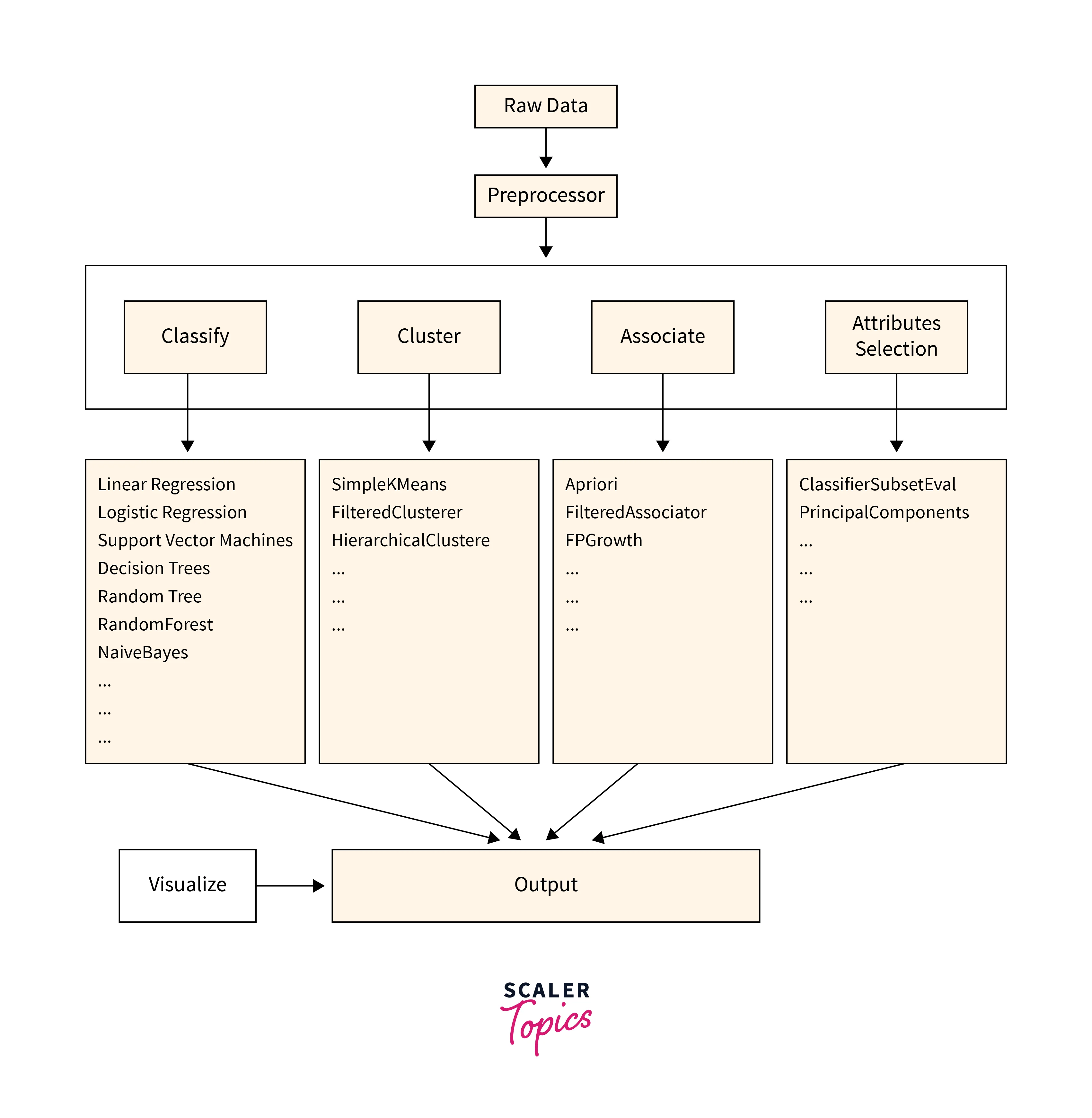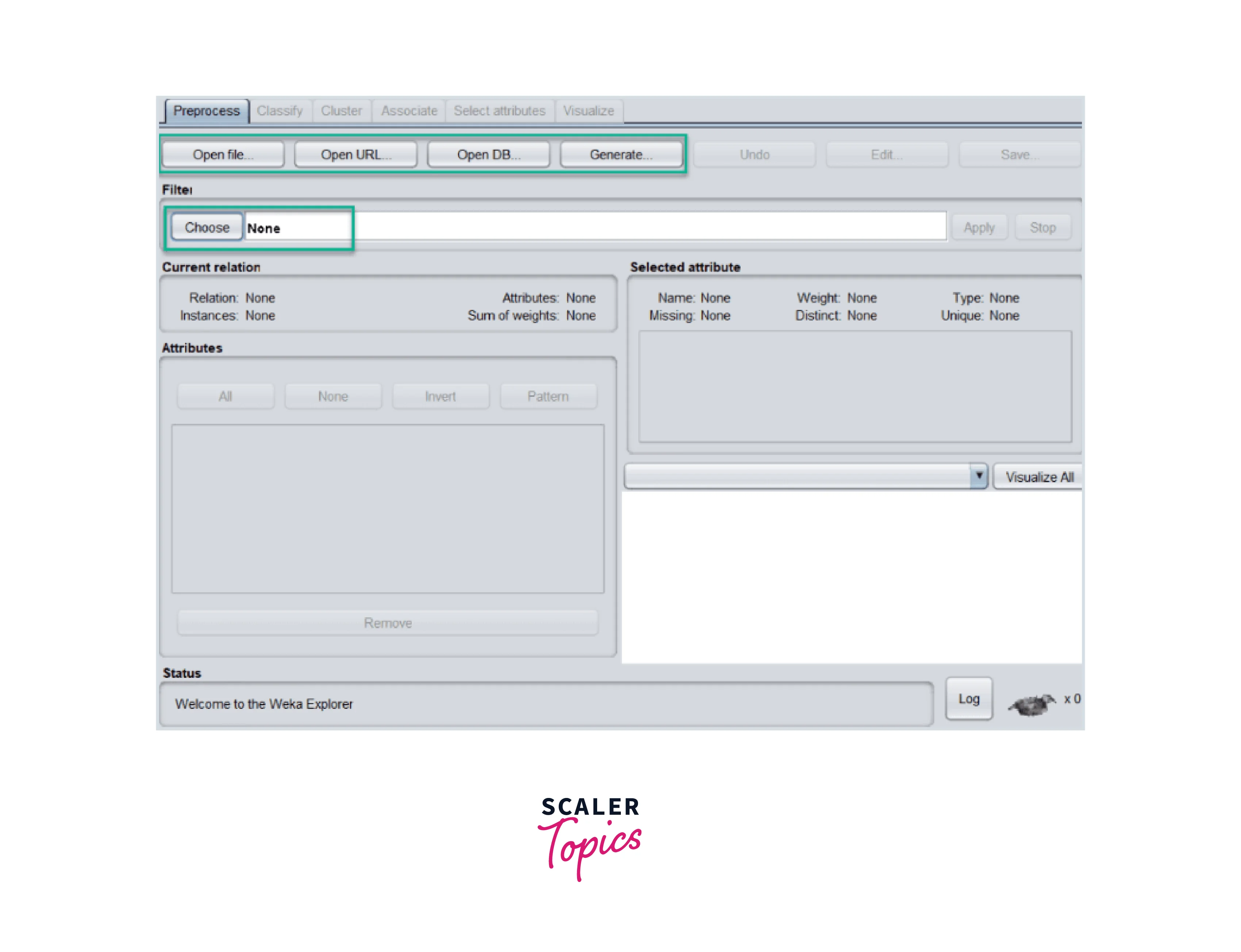Weka in Data Mining
Overview
Weka is an open-source data mining software with a graphical user interface (GUI) and a collection of machine learning algorithms for classification, regression, clustering, association rule mining, and feature selection. It supports scripting, integration with other programming languages, and various data formats. Weka is flexible, extensible, and widely used in academia and industry.
What is WEKA?
Weka (Waikato Environment for Knowledge Analysis) is a popular open-source data mining software developed at the The University of Waikato in New Zealand. It is written in Java and provides a collection of machine learning algorithms for data mining tasks, including classification, regression, clustering, association rule mining, and feature selection.
Weka has a graphical user interface (GUI) that makes it easy for novice and experienced users to use. It also supports scripting and integration with other programming languages, such as Python and R, through its Java API.
One of the strengths of Weka is its flexibility and extensibility. It allows users to experiment with different data mining techniques easily and to build custom algorithms and models. It also supports importing and exporting various data formats, including CSV, ARFF, and Excel.
Weka has been widely used in academic and industrial settings for data mining research and applications. It has a large user community and a wealth of online resources, including tutorials, documentation, and forums.

History of WEKA
The Weka tool in data mining was first developed in the late 1990s at the University of Waikato in New Zealand by a team led by Professor Ian H. Witten. The initial version of Weka was released in 1997, and it was designed to provide a comprehensive set of tools for data mining and machine learning research.
The development of Weka was motivated by the need for a flexible and user-friendly platform for experimenting with various data mining techniques. Over the years, Weka has been continuously updated and improved, with new algorithms and features added to the software.
Features of WEKA
Weka is a versatile and flexible data mining software that provides users with a wide range of features to analyze and model data.
Some of the key features of Weka include the following -
- Graphical User Interface (GUI) - Weka's user-friendly interface allows users to explore data, apply machine learning algorithms, and visualize the results.
- Machine Learning Algorithms - Weka provides a rich collection of machine learning algorithms, including classification, regression, clustering, and association rule mining. It also supports feature selection and ensemble methods.
- Data Preprocessing - Weka offers a variety of data preprocessing options, such as data cleaning, normalization, and attribute selection.
- Scripting and Programming - Weka provides a Java-based API for programming and scripting. It also supports integration with other programming languages like Python and R.
- Visualization - Weka has several visualization tools for exploring and understanding data, including scatter plots, histograms, and decision trees.
- Data import and export - Weka supports various data formats, including CSV, ARFF, and Excel.
- Extensibility - Weka is open-source software that users can easily extend to add new algorithms or features.
Requirements & Installation
To use the Weka tool in data mining, you need a computer with the following requirements -
- Operating system - Windows, macOS, or Linux
- Java - Weka requires Java 8 or higher to be installed on your system.
To install Weka on your computer, follow these steps -
- Go to the Weka download page - https://www.cs.waikato.ac.nz/ml/weka/downloading.html
- Select the appropriate version of Weka for your operating system.
- Download the Weka installer file.
- Run the installer file and follow the prompts to install Weka on your computer.
- Once you have installed Weka, you can launch it by double-clicking the Weka icon on your desktop or running the "weka.jar" file from the command line.

Weka Data Types and Format of Data
Weka tool in data mining supports several data types and formats for data mining and machine learning tasks. The main data type used in Weka is the attribute-relation file format (ARFF), a plain text file format describing the data attributes and their values. ARFF files consist of two main parts - the header and the data.
The header describes the attributes in the data, their data type (numeric, nominal, string, date), and their possible values. The data section contains the actual data in the ARFF format.
Here is an example of an ARFF header and data section -
In addition to ARFF, Weka also supports several other data formats, including CSV, Excel, and JSON.
Loading of Data
WEKA tool in data mining provides support to load data from various types of sources, as mentioned below -
- The local file storage system
- Web URLs
- Databases by querying
- Generate dummy datasets to run and test ML models

Types of Algorithms by WEKA
Weka in data mining provides various machine learning algorithms that can be used for data mining and analysis. These algorithms are available under the Explorer tab of the WEKA.
The algorithms in Weka can be classified into the following groups -
- Bayes - This category includes algorithms based on the Bayes theorem, such as Naive Bayes, BayesNet, and AODE.
- Functions - This category comprises algorithms that estimate a function, such as Linear Regression, Logistic Regression, and Multilayer Perceptron.
- Lazy - This category covers all lazy learning algorithms, such as the K-Nearest Neighbor, Locally Weighted Learning (LWL), and IBk.
- Meta - This category consists of those algorithms that use or integrate multiple algorithms for their work, such as Stacking, Bagging, and AdaBoost.
- Misc - This category includes miscellaneous algorithms that do not fit any of the given categories.
- Rules - This category combines algorithms that use rules, such as OneR, ZeroR, and JRip.
- Trees - This category contains algorithms using decision trees, such as J48, RandomForest, and REPTree.
Weka Extension Packages
Weka tool in data mining also provides a set of extension packages that enhance its functionality and provide additional features. These extension packages can be installed using the Weka Package Manager, which was added in version 3.7.2.
Some of the popular Weka extension packages are - Knowledge Flow, Big Data, Time Series Forecasting, Experimenter, Distributed Weka, Apache Hadoop, etc.
The modular architecture of Weka allows for independent updates of the core software and individual extensions. This makes it easier for contributors to develop and maintain their own extensions and integrate them with Weka. The Weka Package Manager also simplifies the process of installing and managing these extensions.
Conclusion
- Weka stands for Waikato Environment for Knowledge Analysis and is a popular data mining tool that provides various machine learning algorithms, from basic classifiers to advanced ensemble techniques, that can be used for various data mining tasks.
- Weka has a friendly GUI and offers various visualization and preprocessing tools that simplify exploring and analyzing data.
- Weka's modular architecture and support for extension packages allow for easy customization and integration of new algorithms and functionalities, making it a flexible and adaptable tool for data mining tasks.
